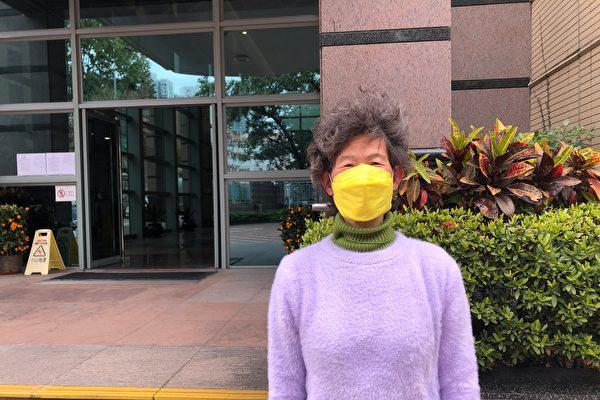A Falun Gong practitioner, who defended herself in court, has been acquitted for displaying informational posters at a flyover near Sheung Shui Station, Hong Kong.
In 2021, local authorities issued Tsang Hau Sim a ticket for “displaying posters on government land without permission” for her displays that showed information on the prosecution of Falun Gong by the Chinese Communist Party (CCP).
On Feb. 3, Tsang’s case was heard by Magistrate Kelly Shui at Fanling Magistrates’ Courts, with barristers Lai Sze Wai representing the Hong Kong Government. The prosecution had 11 witnesses, including the staff members of the Food and Environmental Hygiene Department (FEHD) and Lands Department, nine of whom testified in court.
Tsang defended herself without legal representation. And she did not call a single witness.
Speaking to The Epoch Times, Tsang, in her seventies, admitted that it had been a very challenging time for her fighting the case herself. She had difficulties understanding the legal documents but was motivated by the fact that she had done nothing wrong in telling the truth.
She told the court that on May 27, 2021, she had several posters out leaning on her trolley while talking to passersby about the persecution of Falun Gong by the CCP and that employees from the FEHD issued her a ticket soon after they saw her doing so.
She admitted that she had not obtained a permit; however, she pointed out that the public had no channel to apply except for going through local councilors. She further explained that some Falun Gong practitioners had inquired about how to apply for permits at the Lands Department and had been told by staff that no application was required for displays not exceeding 24 hours.
Tsang said that she only put the panels out when she was handing out Falun Gong flyers and had no intention of displaying them permanently. She believed she didn’t break the law even though she didn’t apply for a permit.
In handing out the judgment, Shui indicated that the FEHD staff members observed the accused displaying her poster for only 30 minutes, which failed to demonstrate “some degree of permanence and habitual regularity,” a requirement to convict someone for the said contravention, according to a previous judgment of the Court of Final Appeal. Shui also said that the FEHD should observe for an extended period to ensure the “permanence and regularity” of the accused actions before they issue tickets.
Posters Exposed ‘Lies of the CCP’ About Falun Gong
Tsang’s posters, pictured in the courtroom, showed how the former CCP regime head Jiang Zemin staged the “Tiananmen self-immolation” incident in 2001 to smear Falun Gong. The panels, illustrated by stills from a China Central Television (CCTV) video, reveal numerous signs of falsification of the incident. The panels also include information on a website that calls on the public to quit the CCP and its associated organizations.In her written submission to the court, Tsang emphasized that she displayed the posters in order to expose the “lies of the CCP” about Falun Gong and its persecution. She also cited an independent people’s tribunal in the UK, which found the CCP guilty of organ harvesting, murder, and genocide.
In her statement, Tsang said, “because the persecution of Falun Gong by the CCP is still going on, I am compelled to come out and do my part, to tell the truth to all those who have been poisoned by the lies of the CCP, to stop and expose the horrific crimes, and to spread the message of Falun Dafa to all. This is why I did what I did at the Sheung Shui Flyover.”
Tsang: It Was a Relief
It had been nearly two years since the court case began, and Tsang said that the legal process had been very difficult. She said she spent a lot of time understanding the law and poring over the documents, including the testimonies of 11 witnesses. Tsang said, “I’m in my 70s, but I felt like an elementary school student doing homework, often for hours.” At first, she was very stressed and worried that she would not be able to speak well in court, but her faith in Falun Gong helped her to look past her personal loss or gains and to face the trial in a calm manner.Asked why she chose to go to court and defend herself instead of just paying the fine of a few thousand Hong Kong dollars (approximately $450), Tsang replied it was because she didn’t think she had done anything wrong. Tough it might be, she knew she had to fight the charge. “We are speaking out against the persecution. Every Falun Gong practitioner is doing it around the world. Why can’t we do it in Hong Kong?”
Since the CCP’s persecution of Falun Gong started in 1999, Falun Gong practitioners in Hong Kong have been protesting peacefully through various means, including putting on banners and posters in busy places and scenic spots. Despite the recent crackdown on civil organizations, Falun Gong practitioners in Hong Kong continue to expose the persecution of Falun Gong to the public by doing exercises and distributing publications in public places.
Despite the brutal persecution by the CCP, Falun Gong has spread throughout the world and has received over 3,000 recognitions to date. The founder, Mr. Li Hongzhi, has had his major work, “Zhuan Falun,” translated into more than 40 languages.




